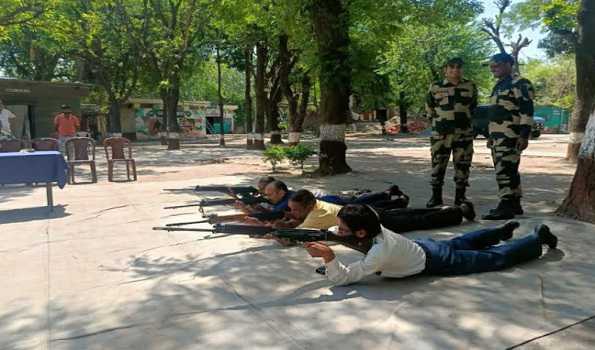In the quiet, scenic villages nestled near the India-Pakistan border in Jammu and Kashmir, life has often been unpredictable. Living so close to the border brings with it both beauty and tension. For decades, the villagers have endured cross-border firing, uncertainty, and security threats that have shaped their daily routines. But now, something new is happening—a move that is giving them not just safety, but also a sense of control over their lives.
The Border Security Force (BSF), known for guarding India’s borders, has taken a unique and thoughtful step. Instead of just being protectors from a distance, they’ve started walking shoulder-to-shoulder with the people they serve. In several villages close to the Line of Control (LoC), BSF personnel have begun training local villagers in firearm safety and self-defence techniques. It’s a bold yet balanced initiative that is turning ordinary citizens into strong, aware individuals capable of handling unexpected dangers.
The goal behind this initiative is simple yet powerful: to make the people living in border areas more aware, more alert, and more prepared. With rising concerns around infiltration, sudden attacks, and militant threats, the need for villagers to be self-reliant during emergencies has grown. The BSF’s new approach ensures that in moments when every second matters, villagers know exactly what to do, and how to stay safe.
The training doesn’t focus on turning civilians into fighters, but rather, on giving them knowledge. Villagers are shown how firearms work, what precautions to take, and how to react calmly during tense situations. They are taught how to distinguish between different types of weapons, how to alert authorities when they see something suspicious, and most importantly, how to keep themselves and their families safe without taking unnecessary risks.
Alongside firearm awareness, the BSF is also teaching villagers self-defence moves that can help them in day-to-day situations. The techniques are simple, easy to learn, and practical for all age groups. From using basic objects for protection to freeing oneself from a tight grip, the focus is on quick, effective responses. Special attention is being given to training women and the elderly, so that safety doesn’t just depend on a few people, but becomes a shared community responsibility.
Interestingly, what makes this initiative special is the trust it’s building. For years, the relationship between security forces and civilians in sensitive regions has been careful and distant. But this training is changing that dynamic. Villagers no longer see BSF officers just as uniformed figures at posts—they now see them as mentors, protectors, and sometimes even friends. Shared stories, smiles, and respectful exchanges have become a regular sight during these sessions.
Children, too, are showing curiosity. While they are not part of the official training, many watch from a distance, their eyes wide with fascination as their parents learn to hold dummy rifles or practice defensive stances. In these young eyes, courage is taking root—not the courage to fight, but the courage to stand tall and stay safe.
The BSF, on its part, is handling this mission with care. Officers involved in the training come with experience not just in combat, but in community relations. They understand the fears, the doubts, and the emotional weight carried by the villagers. Before each session, there are long conversations—moments of listening, of offering reassurance, and of building confidence.
One BSF officer, speaking anonymously, shared that the aim is not to militarise the population but to empower them with knowledge. “We want the villagers to feel confident. They should never feel helpless. If they can stay calm and respond correctly even in a five-minute crisis, we’ve done our job,” he said.
For many villagers, this training is a first. Take Ramesh, a farmer in his forties, who has lived his whole life near the border. “We have always depended on the army or BSF to save us. But now, we are learning how to save ourselves. It feels different. It feels good,” he said, smiling with pride.
Women, too, are embracing the opportunity with enthusiasm. Geeta, a mother of three, explained how self-defence training has changed her mindset. “Earlier, if I heard gunfire, I would panic. Now, I know what to do, how to protect my children, and how to stay calm. That knowledge is powerful.”
There’s also a quiet cultural shift taking place. The sense of fear that used to grip the villages is slowly being replaced by a sense of unity. Villagers are talking more openly about safety, working together, and looking out for each other. From young adults to elders, everyone is participating in some way—whether by joining training sessions or by spreading awareness through local gatherings.
This BSF initiative is not just about defence—it’s about dignity. It’s about telling every border villager that their life, safety, and well-being matter deeply. It sends a strong message: the nation stands with them, not just in uniform, but hand-in-hand.
The road ahead is still uncertain. The challenges of living near a sensitive border will not disappear overnight. But with steps like these, hope grows. The villagers are not just waiting anymore—they’re preparing, they’re learning, and most importantly, they’re believing in themselves.
In a region that has long been seen only through the lens of conflict, this initiative offers a new picture—one of cooperation, courage, and quiet empowerment. And perhaps, that’s exactly what real peace begins with: people who are strong, aware, and united.

